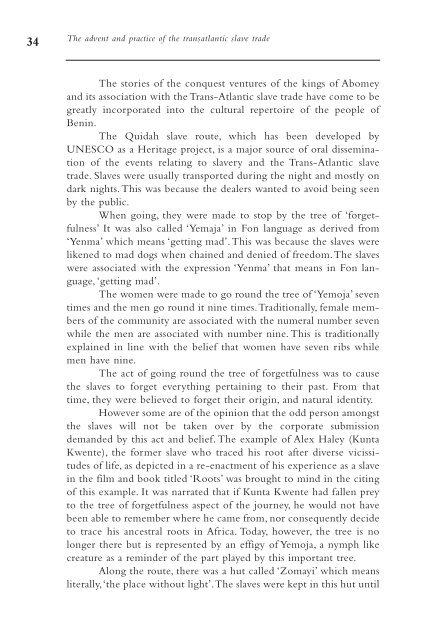Oral tradition relating to slavery and slave trade in Nigeria, Ghana ...
Oral tradition relating to slavery and slave trade in Nigeria, Ghana ...
Oral tradition relating to slavery and slave trade in Nigeria, Ghana ...
You also want an ePaper? Increase the reach of your titles
YUMPU automatically turns print PDFs into web optimized ePapers that Google loves.
34<br />
The advent <strong>and</strong> practice of the transatlantic <strong>slave</strong> <strong>trade</strong><br />
The s<strong>to</strong>ries of the conquest ventures of the k<strong>in</strong>gs of Abomey<br />
<strong>and</strong> its association with the Trans-Atlantic <strong>slave</strong> <strong>trade</strong> have come <strong>to</strong> be<br />
greatly <strong>in</strong>corporated <strong>in</strong><strong>to</strong> the cultural reper<strong>to</strong>ire of the people of<br />
Ben<strong>in</strong>.<br />
The Quidah <strong>slave</strong> route, which has been developed by<br />
UNESCO as a Heritage project, is a major source of oral dissem<strong>in</strong>ation<br />
of the events <strong>relat<strong>in</strong>g</strong> <strong>to</strong> <strong><strong>slave</strong>ry</strong> <strong>and</strong> the Trans-Atlantic <strong>slave</strong><br />
<strong>trade</strong>. Slaves were usually transported dur<strong>in</strong>g the night <strong>and</strong> mostly on<br />
dark nights.This was because the dealers wanted <strong>to</strong> avoid be<strong>in</strong>g seen<br />
by the public.<br />
When go<strong>in</strong>g, they were made <strong>to</strong> s<strong>to</strong>p by the tree of ‘forgetfulness’<br />
It was also called ‘Yemaja’ <strong>in</strong> Fon language as derived from<br />
‘Yenma’ which means ‘gett<strong>in</strong>g mad’.This was because the <strong>slave</strong>s were<br />
likened <strong>to</strong> mad dogs when cha<strong>in</strong>ed <strong>and</strong> denied of freedom.The <strong>slave</strong>s<br />
were associated with the expression ‘Yenma’ that means <strong>in</strong> Fon language,<br />
‘gett<strong>in</strong>g mad’.<br />
The women were made <strong>to</strong> go round the tree of ‘Yemoja’ seven<br />
times <strong>and</strong> the men go round it n<strong>in</strong>e times.Traditionally, female members<br />
of the community are associated with the numeral number seven<br />
while the men are associated with number n<strong>in</strong>e. This is <strong>tradition</strong>ally<br />
expla<strong>in</strong>ed <strong>in</strong> l<strong>in</strong>e with the belief that women have seven ribs while<br />
men have n<strong>in</strong>e.<br />
The act of go<strong>in</strong>g round the tree of forgetfulness was <strong>to</strong> cause<br />
the <strong>slave</strong>s <strong>to</strong> forget everyth<strong>in</strong>g perta<strong>in</strong><strong>in</strong>g <strong>to</strong> their past. From that<br />
time, they were believed <strong>to</strong> forget their orig<strong>in</strong>, <strong>and</strong> natural identity.<br />
However some are of the op<strong>in</strong>ion that the odd person amongst<br />
the <strong>slave</strong>s will not be taken over by the corporate submission<br />
dem<strong>and</strong>ed by this act <strong>and</strong> belief. The example of Alex Haley (Kunta<br />
Kwente), the former <strong>slave</strong> who traced his root after diverse vicissitudes<br />
of life, as depicted <strong>in</strong> a re-enactment of his experience as a <strong>slave</strong><br />
<strong>in</strong> the film <strong>and</strong> book titled ‘Roots’ was brought <strong>to</strong> m<strong>in</strong>d <strong>in</strong> the cit<strong>in</strong>g<br />
of this example. It was narrated that if Kunta Kwente had fallen prey<br />
<strong>to</strong> the tree of forgetfulness aspect of the journey, he would not have<br />
been able <strong>to</strong> remember where he came from, nor consequently decide<br />
<strong>to</strong> trace his ancestral roots <strong>in</strong> Africa. Today, however, the tree is no<br />
longer there but is represented by an effigy of Yemoja, a nymph like<br />
creature as a rem<strong>in</strong>der of the part played by this important tree.<br />
Along the route, there was a hut called ‘Zomayi’ which means<br />
literally,‘the place without light’.The <strong>slave</strong>s were kept <strong>in</strong> this hut until


